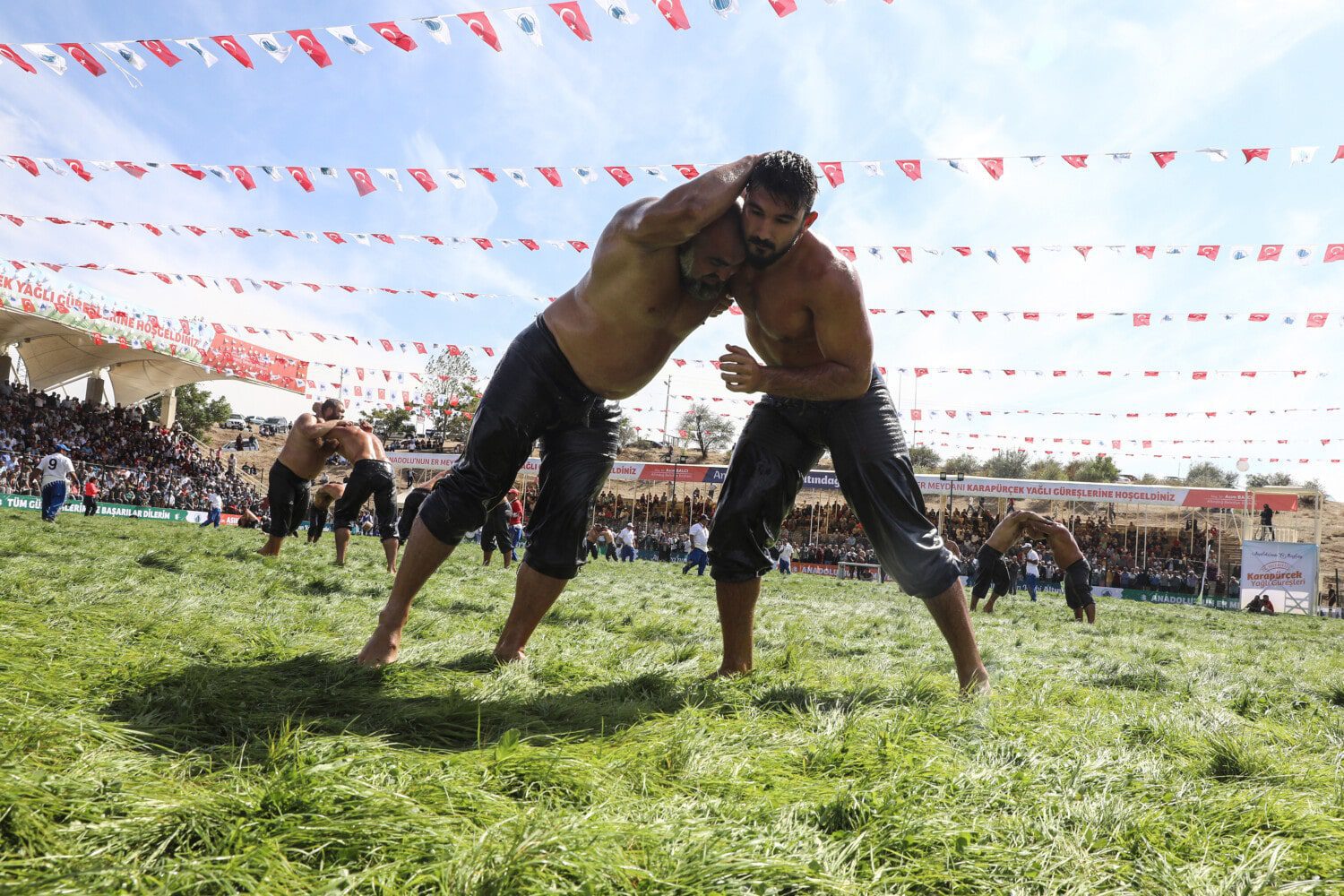
One of Turkey’s most famous treasures is found only within Anatolia. Oil wrestling is not for the faint-hearted: two burly men coated head-to-toe in olive oil and wearing nothing but short, tight trousers made of cow or water buffalo hide wrestle to become champion of one of Turkey’s most famous competitions.
Every year in June near Edirne, the one-time Ottoman capital in western Turkey, the Kirkpinar oil wrestling tournament–the country’s most important–is held. On the grass, the two oiled wrestlers compete, unlike more common wrestling formats, to pick each up in the air and “make their belly face the sky.” Aside from the oil and the lack of a typical wrestling ring within which the fighters must remain, another standout feature of oil wrestling is the length of the bouts. Originally with no fixed time limit, some fights were known to last for hours; in recent years, a 40-minute time-limit has been introduced. Some three tons of olive oil were provided for the 2019 Kirkpinar contest; evidently the sport does no harm to the national oil-producing economy.
Oil obviously acts as a lubricant during the fights, obstructing either fighter from securing an easy grip on their opponent. Similarly, with the tournament’s fights all occurring on the same grassy field, the soil soon becomes slick with oil, further impeding fighters’ firm footing and leading to sometimes comical scenes. The “kispet,” or leather trousers, are the fighters’ only chance of a handhold. These breeches are worn tight on the skin, but an opponent’s oiled hand can easily (and is permitted) to slip inside them for added traction. This is where some of the sport’s few rules come in, as fighters are prohibited from getting too intimate with their opponent’s genitalia. The kispet trousers also act like a soccer jersey, with the fighter’s name and hometown often adorned in metal studs on the seat of the trousers.
Legendary Roots
In 2001, the wrestling tournament in Kirkpinar was recognised by the Guinness Book of World Records as the world’s oldest sports competition. The Kirkpinar contest is said to have been held annually since the mid-14th century, which would make it several centuries older than the modern Olympic Games. Thousands of fighters gather each year to compete for the title.
The competition’s roots are steeped in legend, reportedly dating back to the 1346 Ottoman campaign in Thrace, when two soldiers fought to the death in a wrestling bout in Edirne. While modern-day champions are crowned with cash prizes and a golden belt, Ottoman-era winners were gifted thoroughbred horses, camels or bulls.
However, despite the financial allure of the prize, arguably the greatest reward is the status that comes with being crowned the winner.
More Culture than Sport?
The cultural importance of the sport is such that the Kirkpinar tournament is listed by UNESCO as part of humanity’s “Intangible Cultural Heritage.”
The unofficial national sport of Turkey, with the added status of being an “ancestor sport,” wrestling is lauded as a pure Anatolian pursuit, which distinguishes Turkey in the region (Greece is the only country to pursue oil wrestling in any similar fashion). Furthermore, as it has been practically unchanged for centuries, the sport represents an important link to the past in a period when Turkish politics has veered back to an adulation of Turkey’s glorious history, rather than its Republican promise.
Aside from its official status, the prominence of oil wrestling in Turkish culture is hardly surprising given the values it represents. Above all, the sport is an overt display of masculine strength and physical prowess, which, given Turkey’s obsession with masculinity (even in judicial settings), makes it easy to see why it is still so popularly lauded. That said, at a time when even the country’s leader is harking back to violent historical caricatures like the “Ottoman slap,” oil wrestling also presents a complementary view of Ottoman chivalry, with the winning contestant expected to lift his opponent up from the floor following their bout.
An Ancient Tradition Alive Today
Although an age-old sport, oil wrestling has carved itself an important cultural niche in modern Turkey and still holds weight for those who dream of becoming a champion of Kirkpinar. Oil wrestling has also laid the roots of other sporting movements. No doubt tied to the prominence of wrestling within Turkish traditional sports, the success of Turkey’s modern Olympic athletes is heavily skewed towards wrestlers. At the 2016 Olympic games in Rio, Turkish wrestlers took home five medals (including one gold), representing the lion’s share of Turkey’s seven total medals from the games.
As in the Olympics, very few oil wrestlers make a living from the sport–in 2019, the winner walked away with a 51,000-lira (just under $9,000) prize–but for the most successful of them, fame, veneration, and almost legendary status constitute a prize for life.
Sadly, oil wrestling is not immune from the scourges of modern sports, and in 2013, several athletes were disqualified for doping. However, the cloud of such a scandal has done little to dim the enthusiasm of many Turks for this ancient combat sport. Enshrined in legend, tradition, and an instantly recognisable brand of Turkish culture, oil wrestling is sure to remain a firm fixture on the Turkish sporting calendar for generations to come.

